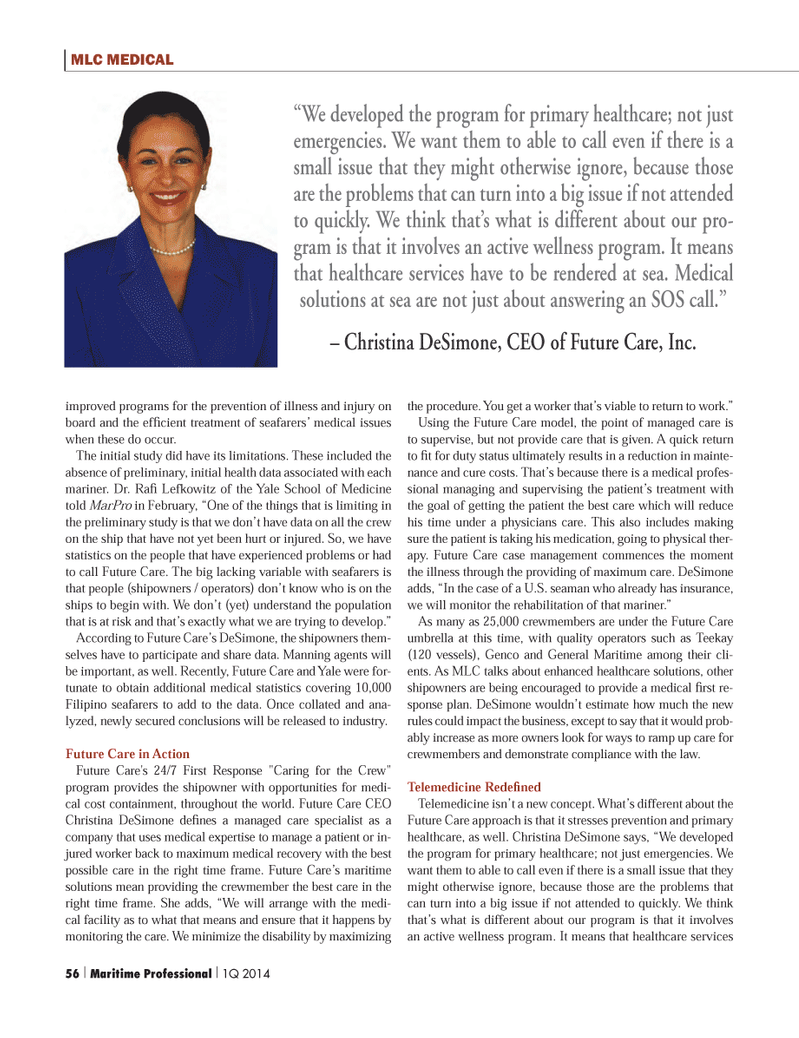
Page 56: of Maritime Logistics Professional Magazine (Q1 2014)
The Energy Edition: Exploration, Production & Transportation
Read this page in Pdf, Flash or Html5 edition of Q1 2014 Maritime Logistics Professional Magazine
improved programs for the prevention of illness and injury on board and the effi cient treatment of seafarers’ medical issues when these do occur.
The initial study did have its limitations. These included the absence of preliminary, initial health data associated with each mariner. Dr. Rafi Lefkowitz of the Yale School of Medicine told MarPro in February, “One of the things that is limiting in the preliminary study is that we don’t have data on all the crew on the ship that have not yet been hurt or injured. So, we have statistics on the people that have experienced problems or had to call Future Care. The big lacking variable with seafarers is that people (shipowners / operators) don’t know who is on the ships to begin with. We don’t (yet) understand the population that is at risk and that’s exactly what we are trying to develop.”
According to Future Care’s DeSimone, the shipowners them- selves have to participate and share data. Manning agents will be important, as well. Recently, Future Care and Yale were for- tunate to obtain additional medical statistics covering 10,000
Filipino seafarers to add to the data. Once collated and ana- lyzed, newly secured conclusions will be released to industry.
Future Care in Action
Future Care's 24/7 First Response "Caring for the Crew" program provides the shipowner with opportunities for medi- cal cost containment, throughout the world. Future Care CEO
Christina DeSimone defi nes a managed care specialist as a company that uses medical expertise to manage a patient or in- jured worker back to maximum medical recovery with the best possible care in the right time frame. Future Care’s maritime solutions mean providing the crewmember the best care in the right time frame. She adds, “We will arrange with the medi- cal facility as to what that means and ensure that it happens by monitoring the care. We minimize the disability by maximizing the procedure. You get a worker that’s viable to return to work.”
Using the Future Care model, the point of managed care is to supervise, but not provide care that is given. A quick return to fi t for duty status ultimately results in a reduction in mainte- nance and cure costs. That’s because there is a medical profes- sional managing and supervising the patient’s treatment with the goal of getting the patient the best care which will reduce his time under a physicians care. This also includes making sure the patient is taking his medication, going to physical ther- apy. Future Care case management commences the moment the illness through the providing of maximum care. DeSimone adds, “In the case of a U.S. seaman who already has insurance, we will monitor the rehabilitation of that mariner.”
As many as 25,000 crewmembers are under the Future Care umbrella at this time, with quality operators such as Teekay (120 vessels), Genco and General Maritime among their cli- ents. As MLC talks about enhanced healthcare solutions, other shipowners are being encouraged to provide a medical fi rst re- sponse plan. DeSimone wouldn’t estimate how much the new rules could impact the business, except to say that it would prob- ably increase as more owners look for ways to ramp up care for crewmembers and demonstrate compliance with the law.
Telemedicine Redefi ned
Telemedicine isn’t a new concept. What’s different about the
Future Care approach is that it stresses prevention and primary healthcare, as well. Christina DeSimone says, “We developed the program for primary healthcare; not just emergencies. We want them to able to call even if there is a small issue that they might otherwise ignore, because those are the problems that can turn into a big issue if not attended to quickly. We think that’s what is different about our program is that it involves an active wellness program. It means that healthcare services
MLC MEDICAL “We developed the program for primary healthcare; not just emergencies. We want them to able to call even if there is a small issue that they might otherwise ignore, because those are the problems that can turn into a big issue if not attended to quickly. We think that’s what is different about our pro- gram is that it involves an active wellness program. It means that healthcare services have to be rendered at sea. Medical solutions at sea are not just about answering an SOS call.” – Christina DeSimone, CEO of Future Care, Inc. 56 | Maritime Professional | 1Q 2014
MP Q1 2014 50-63.indd 56 2/26/2014 1:34:48 PM

 55
55

 57
57
